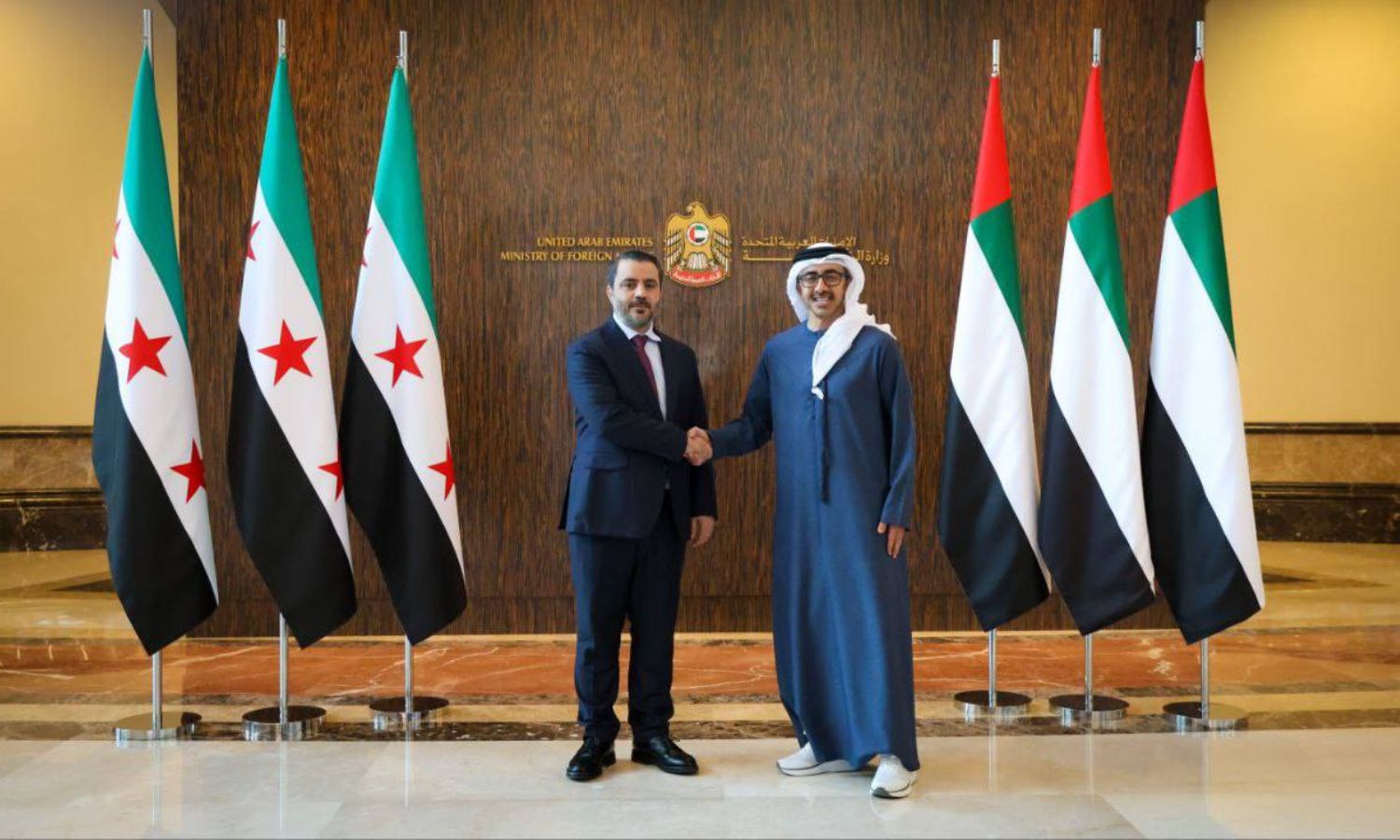
As part of a series of foreign visits, Syrian Foreign Minister Asaad al-Shibani met with his Emirati counterpart Abdullah bin Zayed Al Nahyan, accompanied by a Syrian delegation that included Defense Minister Murhaf Abu Qasra and Intelligence Chief Anas Khattab.
This visit marks the third of its kind in terms of foreign visits by the new Syrian administration and the second in terms of diplomatic engagement with the United Arab Emirates.
The initial contact between the new Syrian administration, which took power after the fall of the regime, and the UAE occurred on December 23, 2024, during a phone call between al-Shibani and his counterpart bin Zayed.
The Emirati Foreign Minister bin Zayed congratulated his Syrian counterpart on taking office and discussed various aspects of joint coordination between the two countries, according to a statement from the Syrian Foreign Ministry.
On January 6, al-Shibani and the Syrian delegation met with representatives from the Emirati government in the capital Abu Dhabi, led by Foreign Minister bin Zayed.
The two delegations discussed ways to enhance relations between the two countries in areas of mutual interest, as well as the overall developments in Syria and regional conditions.
“A positive indicator”
Ayman Dasuki, a researcher in political economy at the Omran Center for Strategic Studies, views the Syrian delegation’s visit to the UAE as a positive indicator for the political and economic revival of Syria.
On the other hand, Dasuki believes it is too early to judge the trajectory of the relationship between the UAE and the new authority in Damascus.
He pointed out in his talk to Enab Baladi that the invitation from the UAE for the new authority to visit is an indicator of its preference for positive engagement with the new leadership and giving it a chance, judging it based on its behavior to determine Abu Dhabi’s options and clarify the outlines of the relationship.
What are the UAE’s concerns?
Abu Dhabi balances its concerns regarding the new authorities and the regional situation surrounding Syria with the gains achieved since the fall of the regime, which include a decline in Iranian influence in the region and regional economic stability, according to Dasuki.
The UAE’s position towards the new Syrian administration is influenced by three main factors, according to the researcher.
The first factor relates to the new Syrian administration’s ability to mitigate the UAE’s concerns through taking serious steps to achieve that.
The second factor pertains to the regional countries’ stance towards Syria and the continuity of Damascus as a competition or cooperation arena among these countries.
The third factor revolves around balancing the calculations of decision-makers in the UAE concerning the emerging gains and risks associated with the situation in Syria and its new administration.
The UAE before the fall of al-Assad
Before the fall of the Syrian regime, the UAE’s stance on the Syrian opposition was ambiguous, as it did not sever ties with Bashar al-Assad, despite occasional tensions.
In his first visit to an Arab state after 2011, al-Assad visited the UAE on March 18, 2022.
In the last communication between the Abu Dhabi government and the ousted president Bashar al-Assad, a phone call took place between him and the UAE President Mohamed bin Zayed on November 31, 2024, just days after the “Deterrence of Aggression” operation that toppled al-Assad’s rule.
At that time, bin Zayed emphasized his state’s stance in confronting what he termed “terrorism and extremism,” stressing the UAE’s solidarity with the previous regime’s position, indicating Abu Dhabi’s support for Bashar al-Assad at that time.
According to Dasuki, Emirati diplomacy is characterized by “high flexibility,” which allows it to reposition and adapt to changes in the regional and international landscape.
Dasuki added that this change is evident through adapting to the current realities in Damascus following the fall of the Assad regime and the rise of a new authority with an Islamic background.
The post Relations and cooperation opportunities between Damascus and Abu Dhabi appeared first on Enab Baladi.